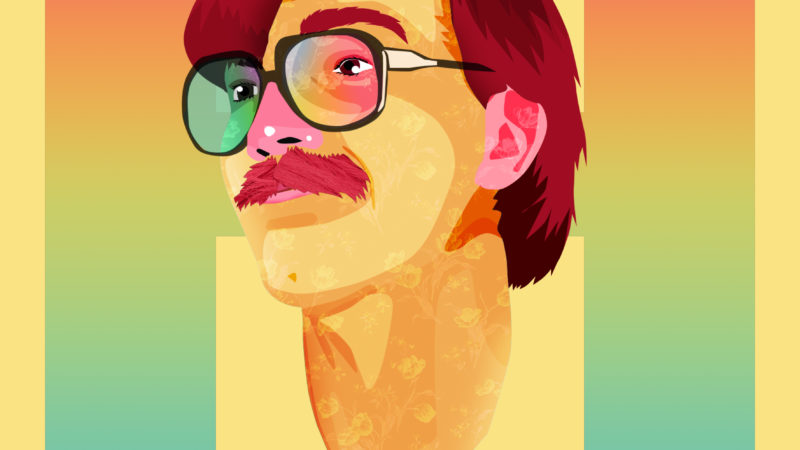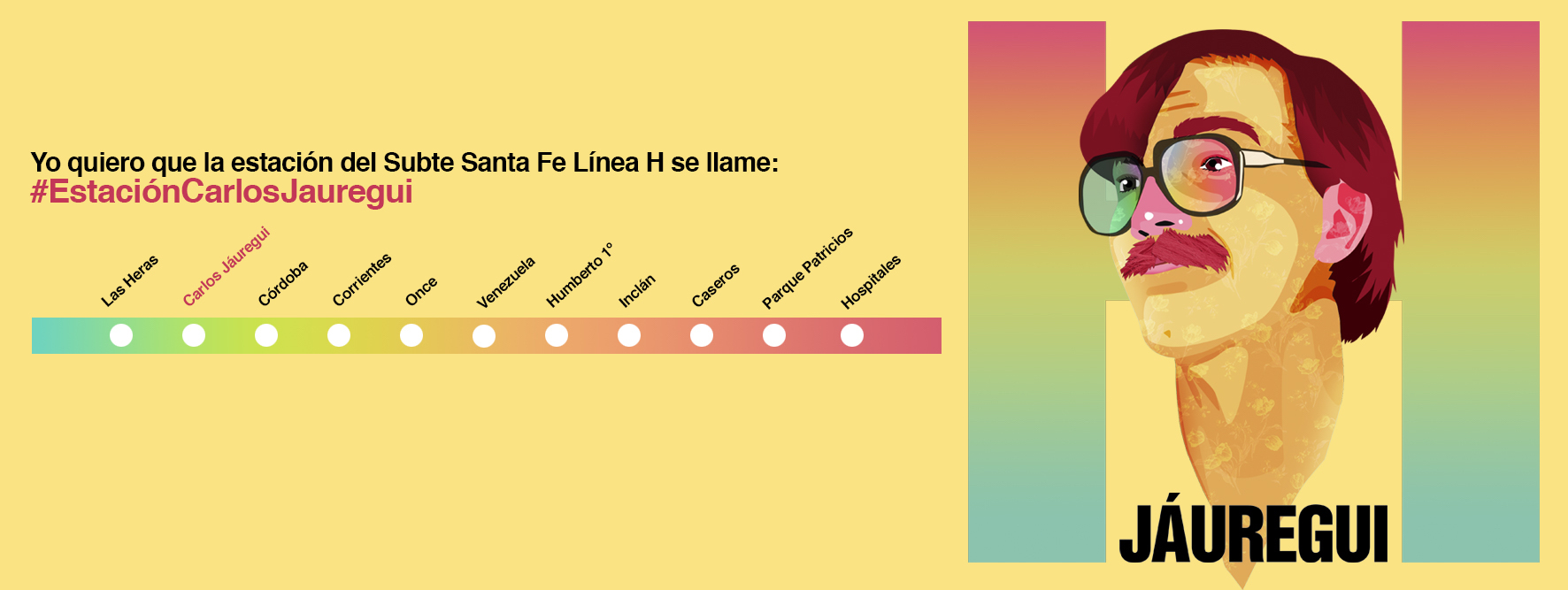
Image designed by the artist Daniel Arzola, creator of the celebrated campaign “I am not your joke”. Published with permission.
In July, a proposal was presented to the municipality of Buenos Aires to rename the recently inaugurated Santa Fe station on Line H of the Buenos Aires subway after Carlos Jáuregui.
Jáuregui, who died in 1996, was for a long time the undisputed face of the battle for LGBTI rights in the country.
The law was introduced by three Buenos Aires legislators and included an intense campaign of support by political figures, civil associations, and members of the LGBTI community.
August 20 will mark the twentieth anniversary of Jáuregui's death.
Jáuregui was the founder and first president of the Comunidad Homosexual Argentina (the Homosexual Community of Argentina, or CHA), created on April 16, 1984, in the dawn of the restoration of democracy after the dark period of military dictatorship that took placen from 1976 to 1983 whose most notorious figure was José Rafael Videla.
He was also the founder of the Asociación Gays por los Derechos Civiles (the Gays for Civil Rights Association) from 1991 until his death and spearheaded the first gay and lesbian pride parade of Buenos Aires in 1992.
César Cigliutti, current President of CHA, affirmed that:
Carlos Jáuregui, como su primer Presidente, le dio su propia identidad y visibilidad a toda nuestra comunidad lésbica, gay, bisexual, trans e Intersexual (LGBTI). Fue la primera persona que dio su nombre y apellido a nuestros reclamos de igualdad de derechos en Argentina.
Carlos Jáuregui, as our first President, gave the lesbian, gay, bisexual, trans and intersex (LGBTI) community its own identity. He was the first person that gave his first and last name to our claims of equality in Argentina.
Moreover, the intersection of the avenues Santa Fe and Pueyrredón where the current Santa Fe station is found, has long been an emblematic gathering point for the LGBTI community of Buenos Aires.
During the dictatorship, it was in this part of the city that the few gay bars and pubs of Buenos Aires operated underground.
In an interview with the newspaper Clarín, the sociologist and writer Ernesto Meccia talked about the years after this period and the beginning of the “gay era”:
La gente se sentía a resguardo en ciertos lugares de socialización de la Ciudad de Buenos Aires (genéricamente, Avenida Santa Fe) y los pocos boliches que existían. Me interesa pensar este fenómeno como la felicidad en el gueto: una felicidad emergente de la mezcla de garantías jurídicas, del trabajo de las organizaciones y de la existencia de entornos de socialización públicos y seguros donde sin temor la gente podía conocerse y reconocerse.
People felt safe in certain meeting places in the City of Buenos Aires (generally known as Avenida Santa Fe) and the few clubs that they had. I like to think of this phenomenon as the happiness in the ghetto: a happiness that comes from the mix of guaranteed rights, the work of organizations, and the existence of public and safe socialization environments where people can be known and recognized without fear.

Work of the Venezuelan artist Daniel Arzola in support of the campaign #EstacionCarlosJauregui [CarlosJaureguiStation]. Image provided by the author and published with his permission.
The achievements by the LGBTI collective were thanks to the intense activism and fight for the visibility and acceptance of homosexuality during the early years of the new democracy that he embodied.
His legacy continues and is present in the sequence of events that led Argentina to become the first country to approve in 2010 same sex marriage in Latin America, a region where conservatism and Catholicism present a longstanding challenge to LGBTI rights.
As part of the campaign to rename the metro station, Venezuelan artist Daniel Arzola, creator of the “I am not a joke” campaign, did a series of portraits of Jáuregui for display, one of which Global Voices has used with his permission.
Meanwhile, the wider community has also shown support for the legislation through a petition on Change.org that has gained 2,000 signatures.
On Twitter, the digital community expressed its support using the hashtag #EstacionCarlosJauregui [CarlosJaureguiStation]:
Estoy listo para salir a inaugurar la #estacioncarlosjauregui !!! pic.twitter.com/b4l2hGgLkj
— Mr_Spok (@Mr_Spok__) August 11, 2016
I'm ready to go inaugurate the #estacioncarlosjauregui !!!
Los unió sonreir, la lucha en común y los abrazos reparadores.#20añosSinCarlosJáuregui#EstaciónCarlosJáureguipic.twitter.com/9bI3Dqxr1o
— Gustavo Pecoraro (@gustavopecoraro) July 26, 2016
Smiles, their common struggle and restorative hugs were their bond.
#Jáuregui anda por todas partes, ahora lo queremos en @BA_subte#EstaciónCarlosJáureguipic.twitter.com/6DUATmtf3R
— Daniel Arzola (@Arzola_d) August 9, 2016
#Jáuregi is everywhere, now we want him in @BA_subte.
The authors of the legislation explained:
Hoy la Ciudad de Buenos Aires se exporta al mundo como “gay friendly” y es considerada destino turístico para el colectivo LGTBI mundial. Este proyecto se propone como oportunidad para certificarlo y, a la vez, para reflejar una parte de la historia de la democracia de nuestro país donde el colectivo LGTBI, sus referentes y sus formas de sociabilización, escriben un capítulo muy importante.
Today the city of Buenos Aires is advertised as “gay friendly” and is considered a tourist destination for the LGBTI population worldwide. This project is proposed as an opportunity to certify that and at the same time, to reflect part of the history of the democracy of our country, wherein the LGBTI population, their benchmarks, and their forms of socialization represent a very important chapter.
Some eight years before the groundbreaking same-sex marriage legislation was passed at national level, Buenos Aires became the first city in Latin America to establish civil unions, recognizing the legal effects of a registered union between two people, regardless of sex or orientation, who have lived together for at least two years.
Key print and digital mass media have also lent support to the campaign to rename the metro station by publicising the proposal, most notably Parlamentario, La Izquierda Diario, Clarín, and Sindicato del Subte.
Maximiliano Ferraro, one of the legislators that presented the project and the driving force of the media campaign, expressed his thanks for the publicity.
Gracias @clarincom por ayudar a difundir que Estación Santa Fe Línea H @BA_subte se llame #EstacionCarlosJaureguipic.twitter.com/PlZX4pW9mm
— maximiliano ferraro (@Maxiferraro) July 21, 2016
Thank you @clarincom for helping to broadcast that Santa Fe Station on Line H @Ba_subte be named #EstacionCarlosJauregui







1 comment